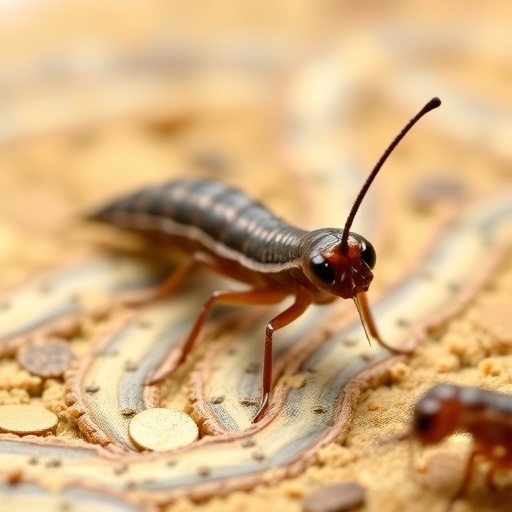The quest for extending human longevity often resembles the storied pursuit of the fabled fountain of youth, a theme deeply interwoven with philosophical musings and scientific inquiries across centuries. As modern advancements in science and technology fuel hopes for achieving enhanced lifespan, researchers are diving deeper into the biological mechanisms that play pivotal roles in aging processes. A recent investigation conducted by a team led by Scott Leiser, Ph.D., at the University of Michigan Medical School, reveals compelling insights into the interplay between gene expression, environmental stimulus, and dietary practices in the context of extending life.
At the heart of this research is the exploration of a specific longevity gene and its response to various environmental cues. The studies focus on the model organism Caenorhabditis elegans, commonly known as the roundworm, which is frequently used in biological research due to its simplicity and the conservation of fundamental biological processes from worm to human. In a study published in the esteemed journal PNAS, the research team uncovered intriguing connections between food accessibility, environmental stimuli, and the resulting implications for lifespan extension governed by specific genes.
The central premise of the research hinges on the fact that both humans and worms respond hormonally to environmental stimuli, which is a crucial aspect of survival mechanisms. Notably, difficulties such as food scarcity have historically been associated with enhanced survival strategies, pushing organisms to adapt metabolically. Dr. Leiser articulates how neurotransmitters, like adrenaline and dopamine, are released in response to perceived environmental challenges, resulting in altered physiology that may, under certain scenarios, promote longevity.
Interestingly, with previous findings indicating that even the mere scent of food could overturn the beneficial effects of dietary restrictions on lifespan as evidenced in fly studies, Leiser and his team sought to investigate if additional sensory inputs could also influence this relationship. By incorporating tactile sensations into their experimental design—essentially recreating a feeding-like environment using textured beads—the researchers aimed to determine whether these stimuli could similarly counteract the life-prolonging impacts of caloric restriction observed in their study subjects.
The results were profoundly revealing. The tactile sensation provided by the beads created an environment conducive enough to diminish the expression of the fmo-2 gene, a vital component identified by the research team that plays an essential role in mediating the longevity effects resulting from dietary restriction. Specifically, the study established that the fmo-2 enzyme reshapes metabolic processes to extend lifespan, emphasizing the complex relationship between environmental factors and genetic regulation of longevity.
As the researchers drilled down into the genetic and metabolic pathways involved, they uncovered that tactile stimuli activated neurotransmitter circuits that modulate signals released from cells, ultimately leading to decreased expression of fmo-2. This dynamic illustrates a fascinating interplay whereby environmental touch can significantly alter genetic expressions related to lifespan, thus highlighting the potential for manipulating sensory inputs in deriving positive health outcomes.
However, the implications of altering gene expression for longevity aren’t without concerns. The subsequent studies conducted by Leiser’s team unveiled additional intricacies surrounding the impact of fmo-2 on behavioral expressions in the worms. When overexpressing the fmo-2 gene, the worms exhibited apathy towards environmental cues, both negative and positive. This behavioral tendency pointed towards a direct connection between metabolic changes instigated by the gene and alterations in exploratory behavior, which raises profound questions regarding the broader impacts of such genetic interventions.
Moreover, upon examining worms deficient in fmo-2, researchers noted a significant reduction in environmental exploration compared to their normal counterparts. These dual revelations underscore the intricate web connecting genetic expression, behavioral responses, and environmental stimuli that warrant careful contemplation in the pursuit of longevity. It suggests that while life-extending interventions hold promise, they may present trade-offs in behavioral engagement and adaptive responses.
Delving deeper, the research advocates the need for comprehensive studies to explore the multifaceted influences of fmo-2 on the organism and poses challenges that future interventions may need to navigate. Dr. Leiser articulated the critical nature of advancing our understanding of these pathways, as the trade-offs associated with life-extension strategies may manifest in behavioral side effects. The ongoing research is poised to unravel specific modulators alongside fmo-2 that could potentially ameliorate these downsides.
In conclusion, this remarkable body of work sets a remarkable precedent for integrating behavioral science with longevity research, advocating a cross-disciplinary approach to understanding the nuances of aging. As scientists investigate the connections between the brain, metabolism, and overall health, the emphasis is placed on possible pharmaceuticals that could manipulate native biological pathways without the necessity of dietary compromises. With avenues slowly revealing their potential, the daunting prospect of extending human life may become more beneficial, steering the way towards innovative therapeutic strategies forged in the lab’s discoveries.
Through rigorous exploration of these genetic pathways and interpersonal interactions with the environment, researchers like Dr. Scott Leiser stand at the helm of a new frontier in longevity research, keen on unlocking the doors to prolonged and healthier lives and heralding advancements that resonate deeply with humanity’s age-old dreams.
Subject of Research: The relationship between gene expression, dietary restriction, and longevity in model organisms.
Article Title: Insights into the Molecular Mechanisms of Longevity and Their Implications for Human Health.
News Publication Date: [Not applicable]
Web References: [Not applicable]
References: [Not applicable]
Image Credits: [Not applicable]
Keywords
Aging populations, Clinical medicine, Personalized medicine, Translational research, Bioengineering, Genetic methods, Life sciences.




